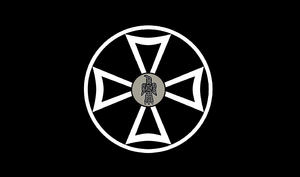Acrean Empire: Difference between revisions
No edit summary |
No edit summary |
||
| Line 38: | Line 38: | ||
|year_leader4 = | |year_leader4 = | ||
|title_leader = King | |title_leader = King | ||
|today = [[Acrea]] <br> [[Æþurheim]] <br> [[Akashi]] <br> [[Delkora]] <br> [[Shalum]] <br> [[Svinia]] <br> [[Venetian Principality]] <br> [[ | |today = [[Acrea]] <br> [[Æþurheim]] <br> [[Akashi]] <br> [[Delkora]] <br> [[Shalum]] <br> [[Svinia]] <br> [[Venetian Principality]] <br> [[ | ||
|footnote_a = Declaration of the [[Acrea|Kingdom of Acrea]] | |footnote_a = Declaration of the [[Acrea|Kingdom of Acrea]] | ||
|footnote_b = | |footnote_b = | ||
| Line 45: | Line 45: | ||
}} | }} | ||
The '''Acrean Empire''', also called the '''Empire of Acre''', was a kingdom in [[Eracura]] which grew to become an empire and the dominant state on the continent for nearly a millennium. It was established by the proclamation of [[Domedric I]], after the Kingdom of Acre successfully absorbed all territories recognised as modern day [[Acrea]] (including [[Venetia]]). The Empire served as the home of the Ancient Acreans, a Nordic ethnolinguistic group which has today expanded to included the three major linguistic groups of Acrea, which have long been considered part of a modern single Acrean pan-ethnicity or pan-nationality. | The '''Acrean Empire''', also called the '''Empire of Acre''', was a kingdom in [[Eracura]] which grew to become an empire and the dominant state on the continent for nearly a millennium. It was established by the proclamation of [[Domedric I]], after the Kingdom of Acre successfully absorbed all territories recognised as modern day [[Acrea]] (including [[Venetia]]) in 282 BCE. The Empire served as the home of the Ancient Acreans, a Nordic ethnolinguistic group which has today expanded to included the three major linguistic groups of Acrea, which have long been considered part of a modern single Acrean pan-ethnicity or pan-nationality. T | ||
==Etymology== | ==Etymology== | ||
Revision as of 10:20, 29 November 2021
{{Infobox former country
|native_name = Norðlandriget
|conventional_long_name = Acrean Empire
|common_name = Acrea
|era = Antiquity to Medieval
|status =
|status_text =
|government_type = Absolute Monarchy
|event_start = Established
|date_start =
|year_start = 282 BCE
|event_end = Dissolved
|date_end =
|year_end = 1010 CE1
|image_flag =  |image_map =
|image_map_alt =
|image_map_caption =
|image_map2 =
|image_map2_alt =
|image_map2_caption =
|capital = Acrea
|capital_exile =
|national_motto =
|national_anthem =
|common_languages = Old Nordic
|image_map =
|image_map_alt =
|image_map_caption =
|image_map2 =
|image_map2_alt =
|image_map2_caption =
|capital = Acrea
|capital_exile =
|national_motto =
|national_anthem =
|common_languages = Old Nordic
Gothic
|religion = Asuryan
|demonym = Acrean
|currency = Mark
|leader1 =
|leader2 =
|leader3 =
|leader4 =
|year_leader1 =
|year_leader2 =
|year_leader3 =
|year_leader4 =
|title_leader = King
|today = Acrea
Æþurheim
Akashi
Delkora
Shalum
Svinia
Venetian Principality
[[
|footnote_a = Declaration of the Kingdom of Acrea
|footnote_b =
|footnote_h =
|footnotes =
}}
The Acrean Empire, also called the Empire of Acre, was a kingdom in Eracura which grew to become an empire and the dominant state on the continent for nearly a millennium. It was established by the proclamation of Domedric I, after the Kingdom of Acre successfully absorbed all territories recognised as modern day Acrea (including Venetia) in 282 BCE. The Empire served as the home of the Ancient Acreans, a Nordic ethnolinguistic group which has today expanded to included the three major linguistic groups of Acrea, which have long been considered part of a modern single Acrean pan-ethnicity or pan-nationality. T